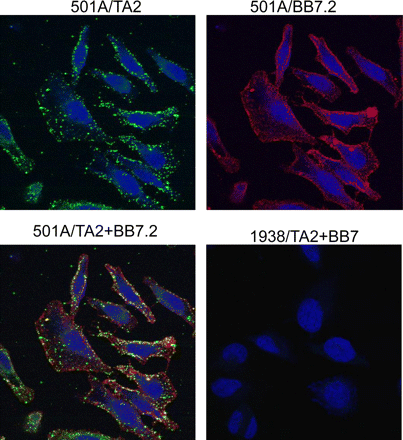Tumor and virus-infected cells are recognized by CD8+ cytotoxic T cells that, in response, are activated to eliminate these cells. In order to be activated, the clonotypic T-cell receptor (TCR) needs to encounter a specific peptide antigen presented by the membrane surface major histocompatibility complex (MHC) molecule. Cells that have undergone malignant transformation or viral infection present on their MHC class I molecules peptides derived from tumor-associated antigens or viral proteins. Therefore, disease-specific MHC/peptide complexes are desirable targets for immunotherapeutic approaches. One such approach transforms the unique fine specificity but low intrinsic affinity of TCRs to MHC/peptide complexes into high-affinity soluble antibody molecules endowed with a TCR-like specificity toward tumor or viral epitopes. These antibodies, termed TCR-like antibodies, are being developed as a new class of immunotherapeutics that can target tumor and virus-infected cells and mediate their specific killing. In addition to their therapeutic capabilities, TCR-like antibodies are being developed as diagnostic reagents for cancer and infectious diseases, and can serve as valuable research tools for studying MHC class I antigen presentation.

Immunofluorescence detection of HLA-A2-tyrosinase complexes on the surface of melanoma cells, Expression hierarchy of T cell epitopes from melanoma differentiation antigens: unexpected high level presentation of tyrosinase-HLA-A2 Complexes revealed by peptide-specific, MHC-restricted, TCR-like antibodies. Michaeli Y, Denkberg G, Sinik K, Lantzy L, Chih-Sheng C, Beauverd C, Ziv T, Romero P, Reiter Y.J Immunol. 2009 May 15;182(10):6328-41.
Antigen presenting cell-associated four-domain MHC class-II molecules play a central role in activating specific CD4+ T cells involved in autoimmune diseases, such as Type 1 Diabetes and Multiple Sclerosis. We isolated and characterized novel antibodies against autoreactive T-cell epitopes associated these disease. These antibodies mimic the specificity of the CD4+ autoreactive T-Cell receptor, while binding MHC class II/peptide complexes in an autoantigen peptide specific, MHC restricted manner. Our data suggest that antigen-specific TCRL antibodies targeting autoreactive class II epitopes are valuable tools as agents that enable studies related to antigen presentation as well as novel therapeutic and diagnostic agents that may be used to treat autoimmune disorders.